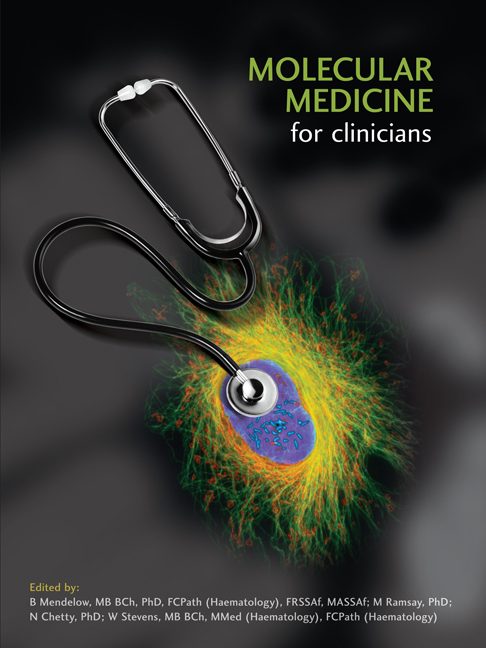Book contents
- Frontmatter
- Contents
- Foreword
- Acknowledgements
- Chapter 1 Introduction
- Keynote Essay 1: Defining Who We Are: DNA in Forensics, Genealogy and Human Origins
- Section 1 Principles Of Cellular And Molecular Biology
- SECTION 2 MOLECULAR PATHOLOGY
- Chapter 8 Genomes and the Environment: An Overview of Molecular Pathology
- Chapter 9 Genetics, Genomics, Health and Disease: General Considerations
- Chapter 10 Chromosome Disorders
- Chapter 11 Mendelian Inheritance
- Chapter 12 Unusual Molecular Processes that Impact on Disease
- Chapter 13 Population Genetics
- Chapter 14 Complex Multifactorial Inheritance
- Chapter 15 Molecular Basis for Phenotypic Variation
- Chapter 16 Medical Genetics
- Keynote Essay 3: Human Cloning: Should We Go There?
- Chapter 17 Neoplasia: General Considerations
- Chapter 18 Oncogenes
- Chapter 19 Mammalian DNA Repair
- Chapter 20 Tumour Suppressor Genes and Inherited Susceptibility to Cancer
- Chapter 21 Carcinoma
- Chapter 22 Leukaemias and Lymphomas
- Chapter 23 Molecular Approaches to the Diagnosis, Prognostication and Monitoring of Cancer
- Keynote Essay 4: Microbes, Molecules, Maladies and Man
- Chapter 24 Molecular Basis of Infectious Diseases: General Considerations
- Chapter 25 Immunology
- Chapter 26 Human Immunodeficiency Virus
- Chapter 27 Tuberculosis
- Chapter 28 Malaria
- Chapter 29 Influenza
- Chapter 30 Oncogenic Viruses
- Chapter 31 Vaccines and Immunisation
- Keynote Essay 5: Drugs and the 21st Century
- SECTION 3 MOLECULAR THERAPEUTICS
- SECTION 4 RESEARCH AND THE CONTINUING EVOLUTION OF MOLECULAR MEDICINE
- Glossary
- Contributors’ Biographies
- Source Material And Recommended Reading
- Permissions And Credits
- Index
Chapter 24 - Molecular Basis of Infectious Diseases: General Considerations
from SECTION 2 - MOLECULAR PATHOLOGY
Published online by Cambridge University Press: 04 June 2019
- Frontmatter
- Contents
- Foreword
- Acknowledgements
- Chapter 1 Introduction
- Keynote Essay 1: Defining Who We Are: DNA in Forensics, Genealogy and Human Origins
- Section 1 Principles Of Cellular And Molecular Biology
- SECTION 2 MOLECULAR PATHOLOGY
- Chapter 8 Genomes and the Environment: An Overview of Molecular Pathology
- Chapter 9 Genetics, Genomics, Health and Disease: General Considerations
- Chapter 10 Chromosome Disorders
- Chapter 11 Mendelian Inheritance
- Chapter 12 Unusual Molecular Processes that Impact on Disease
- Chapter 13 Population Genetics
- Chapter 14 Complex Multifactorial Inheritance
- Chapter 15 Molecular Basis for Phenotypic Variation
- Chapter 16 Medical Genetics
- Keynote Essay 3: Human Cloning: Should We Go There?
- Chapter 17 Neoplasia: General Considerations
- Chapter 18 Oncogenes
- Chapter 19 Mammalian DNA Repair
- Chapter 20 Tumour Suppressor Genes and Inherited Susceptibility to Cancer
- Chapter 21 Carcinoma
- Chapter 22 Leukaemias and Lymphomas
- Chapter 23 Molecular Approaches to the Diagnosis, Prognostication and Monitoring of Cancer
- Keynote Essay 4: Microbes, Molecules, Maladies and Man
- Chapter 24 Molecular Basis of Infectious Diseases: General Considerations
- Chapter 25 Immunology
- Chapter 26 Human Immunodeficiency Virus
- Chapter 27 Tuberculosis
- Chapter 28 Malaria
- Chapter 29 Influenza
- Chapter 30 Oncogenic Viruses
- Chapter 31 Vaccines and Immunisation
- Keynote Essay 5: Drugs and the 21st Century
- SECTION 3 MOLECULAR THERAPEUTICS
- SECTION 4 RESEARCH AND THE CONTINUING EVOLUTION OF MOLECULAR MEDICINE
- Glossary
- Contributors’ Biographies
- Source Material And Recommended Reading
- Permissions And Credits
- Index
Summary
INTRODUCTION
Infectious diseases pose a major global health problem, contributing to significant morbidity and mortality, particularly in developing countries. A combination of environmental, pathogen and host genetic factors play a role in determining susceptibility to microbes and the ultimate course of infection. A constant battle rages between infectious agents and host immune systems. The knowledge of how org an isms vary to escape recognition is central to vaccine and drug design, the control of epidemics and understanding the likely evolution of organisms. Common themes are developed in the course of this text using examples of viral, bacterial and parasitological pathogens that exemplify mechanisms of infectious disease and are of particular relevance to South Africa and the region. This will include reference to HIV, tuberculosis and malaria, diseases responsible for the greatest disease burden in Africa.
Micro-organisms may inhabit the body as normal flora, opportunistic pathogens or true pathogens. Each has its own unique physiology and associated metabolic path ways. The main role of the diagnostic micro biologist is to isolate, identify and analyse the organisms that cause disease in humans. A patient usually presents with signs and symptoms (often very non-specific) suggesting an infectious disease process. Fever has been recognised as one of the most characteristic signs of infection. A multitude of other symptoms may be present depending on the causative organism and the organ system involved. The cornerstone of diagnosis is identification of the ‘bug’ or organism. In this text a brief introduction to conventional techniques will be given, but the focus will be on the application of molecular methods to identify and characterise infectious agents. Any clinical sample can be used to detect the presence of foreign, non-human DNA or RNA. Every species has a unique genome, and we are therefore not only looking for an abnormality in the genome, but a specific sequence characteristic of a particular organism.
Organisms may be classified on the basis of a number of genotypic or phenotypic characteristics. Sub-species may be based on phenotypic differences including protein, bacterio phage and chromatographic profiles, biotyping and susceptibility studies. Genotypic differences may be determined by DNA or RNA analysis, phage typing and restriction fragment length polymorphism (RFLP) analysis. Classification may also be based on cell organisation and function.
- Type
- Chapter
- Information
- Molecular Medicine for Clinicians , pp. 284 - 288Publisher: Wits University PressPrint publication year: 2008



